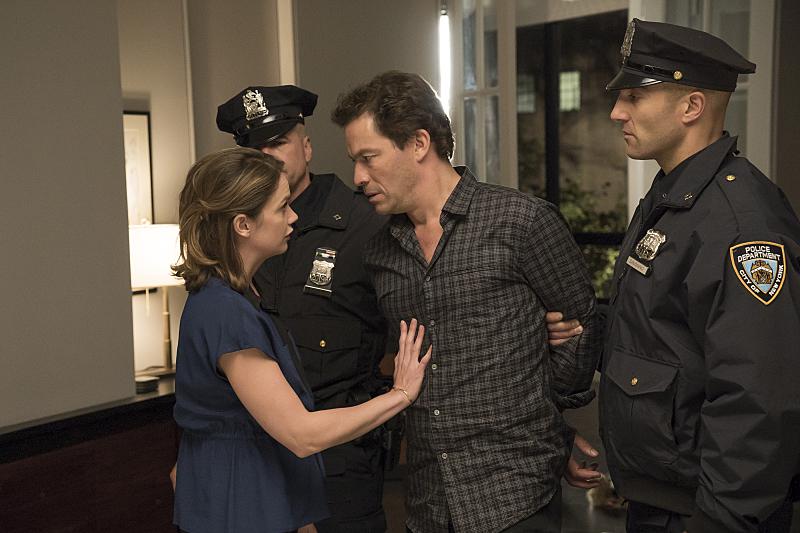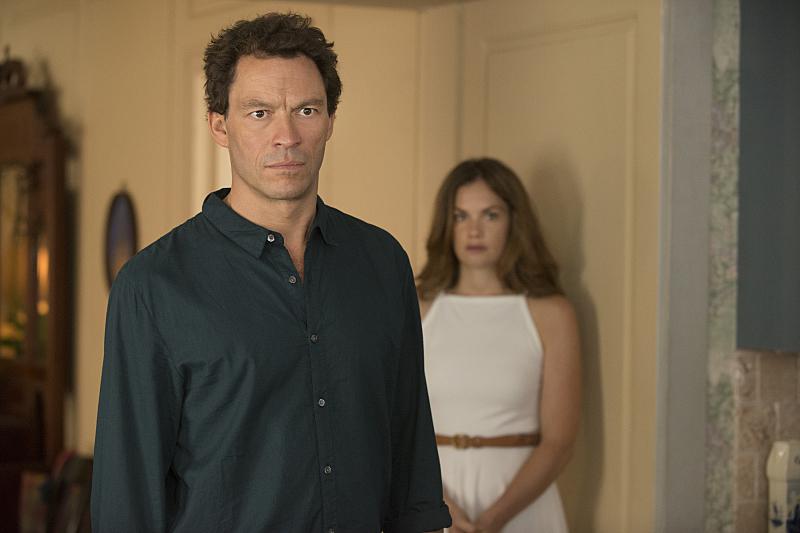Part 1: Sharan
I like to think of The Affair, Showtime’s he-said-she-said whodunit set in Montauk and Brooklyn, as the guilty pleasure of prestige television—except that the show seems to try as hard as it can to avoid being pleasurable. The pacing can be ponderous, the writing can be self-serious, and the Rashomon-like storytelling often serves no other purpose than to double an episode’s running time. But Sunday’s season finale was invigorating television, and its first five or so minutes marked a series-saving shift in tone.
Those opening minutes echo the season’s pilot: Both episodes begin with Noah Solloway (Dominic West) exercising in a lap pool and emerging to see Jules (Carolina Ravassa), a slinky swimmer with a come-hither stare. In the pilot, Noah flashes his ring and bids her adieu; now he’s separated from his wife, and eminently available. Their tryst kicks off a montage, set to the Animals’ “It’s My Life,” wherein Noah goes on a sex spree, loses his job, grows apart from his children, and seems more content than we’ve ever seen him.
It’s a thrilling and deeply satisfying sequence because Noah is an enormous asshole, and The Affair usually displays a peeving ambivalence in presenting that fact. Nuance is important—no one is entirely good or bad—but the show’s writers often confuse even-handedness for profundity. Noah is not well-meaning; he’s after the joyous carnal freedom of youth, and he’s willing to sacrifice his marriage to obtain it. Despite this very obvious character trait, earlier episodes stubbornly attempted to make him seem like a good father, or a sensitive, ill-treated writer, as though these qualities make him more compelling. They do not. Noah is a father and a writer, but one who’s most interesting when he’s at his most selfish, and the intermittent redemption of his personality felt like bad faith characterization. Granted, some of the sympathy in his portrayal can be attributed to half the show being presented from his point of view; but really he’s horrible in both his and Allison’s perspectives. There aren’t actually two sides to every story, and The Affair’s main flaw was how it pursued complexity at the cost of coherence.
Sunday’s finale abandoned that approach, liberating the jerk to do as he pleased. This was Noah at his worst: His children hate him, his love life is a series of one-night stands, he blackmails an auto mechanic to hide details of Scotty Lockhart’s death, and—if Allison’s perspective is to be trusted—he abandons his wife and daughter seconds after they are almost shot by his mistress’s husband.
That’s the Noah we know and hate, and The Affair is a rollicking good time when it embraces his deep and permanent flaws. Even Allison—who, by virtue of having a dead kid, gets cut a bit more slack for her missteps—is bracingly, wondrously imperfect in this episode. When she says she wants to “forget” Cole, when she blames him for Gabriel’s death, we know her feelings aren’t fair or kind or even justifiable. But they feel true.
That’s because The Affair is a study of how happiness can turn into unhappiness, not for any good reason but for the mere sake of change. True Detective used alternating perspectives and a flashback structure to explore the realities of two people; The Affair uses the same devices to explore the emotional decay of two families. The facts, and the murder mystery itself, are incidental.
That may seem wrong-headed given how the finale brings the criminal investigation to the fore. But this show has never been closer to what it’s supposed to be—a smart, silly, soapy exploration of two people in committed relationships harboring the same dark secret. The Affair is no longer about the affair, and it’s all the better for it.

Photo by Mark Schafer/Showtime
Part 2: Miriam
The Affair finale confirmed all my fears about what a multiple-season version of the emotionally poignant drama was likely to become. The show does resolve how the titular affair concluded—but it also ends with a cliffhanger concerning the totally unnecessary murder investigation that has been ramped up in recent episodes as we’re led to believe that Noah Solloway is a very viable suspect.
Yes, I understand that the murder investigation is a framing device that sets up the show’s two perspectives (much as Ted Mosby had to keep telling his children about their mother). But the investigation could have been into someone else’s crime, which Noah and Allison merely witnessed, or the crime could have been something less grave than murder, making it incidental to the love story that should be the focus of the series. So many serious TV shows want to be about everything, but every love story does not need to be about a murder and every story does not need a cliffhanger. The framing device did not have to become the heart of the show.
And this show did have heart. A quiet, contemplative heart. It was a story of everyday life—with the addition of an illicit affair—told from two perspectives. It felt, at its best, like a visual poem. The show’s greatest strength was the way it portrayed inner lives, thanks to the way the two leads’ perspectives and memories were shown to have evolved over time. The plot mattered, of course, but The Affair was meditative TV, devoid of frenzied action. It let us ruminate on how blame shifted and events were deemed irrelevant by one character, while taking on great consequence for the other. The first half of the season was slow moving, sometimes even painfully so. But that deliberate pace was its greatest attribute. We met two people, we got to know these two people, and we tried to understand their actions. Noah and Allison were not looking to stray from their marriages, but, in the end, they did. Why? And what would that bring?
Now, with Noah and Allison together, we’ve basically departed from the show’s premise—a love story born out of infidelity—and arrived at a murder mystery. And I don’t really want to see their two perspectives on the murder.
This finale demonstrated again how fleshed out the character of Noah Solloway has become. After a flurry of post-separation sexual adventures, he ends up in a rubber room, punishment for having sex in a classroom at the school where he teaches. There he finishes his book—a fellow teacher he meets in the rubber room even calls him a hero. On the other hand, we learn almost nothing about Allison. She escaped from her drug dealing in-laws and the shadow of her dead child. But what did she gain? We don’t know what she does now, how she spends her time; we only know what she doesn’t do anymore. Ultimately, this has become a show about Noah Solloway, another male asshole I just can’t bring myself to care about.
As a result, what was my favorite part of the show—the variations in their stories as they each tell them to the detective—now gets on my nerves. I’m annoyed, looking back, at the discrepancies between Noah and Allison’s versions of events. Why, if they are now together, do their stories diverge so dramatically? Wouldn’t they have settled on one version of events, either over time, or before they were separately interrogated? These are not two people who have spent the last several years apart after having a summer fling, we now know. They live together and have a child.
Even as I ask these questions, I realize I no longer care. The show has lost me. At least we got a great theme song out of it.
